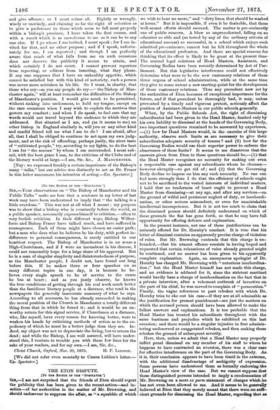[TO TRH EDITOR OF THE STECTATOR.1
SIH,—Your observations on " The Bishop of Manchester and his Public Talks " make me fear that a sentence in my letter of last week may have been understood to imply that " the talking is a little overdone." This was not at all what I meant ; my purpose was to show that a bishop who is constantly before the world, as a public speaker, necessarily exposes himself to criticism,—often to very foolish criticism. In their different ways, Bishop Wilber- force and Bishop Fraser have talked much, and have suffered in consequence. Each of them might have chosen an easier path ; but a man who does what he believes be his duty, with perfect in- difference to personal consequences, is surely entitled to our heartiest respect. The Bishop of Manchester is in no sense a High-Churchman, and if I were an incumbent in his diocese, I could not reasonably hope for a large share of his approval. But he is a man of singular simplicity and disinterestedness of purpose, as the Manchester people, I doubt not, have found out long before this. If he makes three or four speeches on as many different topics in one day, it is because he be- lieves every single speech to be of service to the cause he has at heart ; and as you justly observe, he knows the true conditions of getting through his real work much better than the fastidious literary people at a distance, who read in the newspapers the generally inaccurate summary of what he says. According to all accounts, he has already succeeded in making the moral position of the Church in Manchester a totally different thing from that in which he found it ; and it would be an un- worthy return for this signal service, if Churchmen at a distance, who, like myself, have every reason for knowing better, were to weaken his bands by criticising methods of action as to the ex- pediency of sthich he must be a better judge than they are. In- deed, my object was not to depreciate the living, but to screen the dead ; and while the Bishop, I am well assured, will have under- stood this, I venture to trouble you with these few lines for the sake of your readers, and for my own.—I am, Sir, &c., Christ Church, Oxford, Nov. 20, 1875. H. P. LIDDON.
[We did not refer even mentally to Canon Liddon's letter.— En. Spectator.]


































 Previous page
Previous page